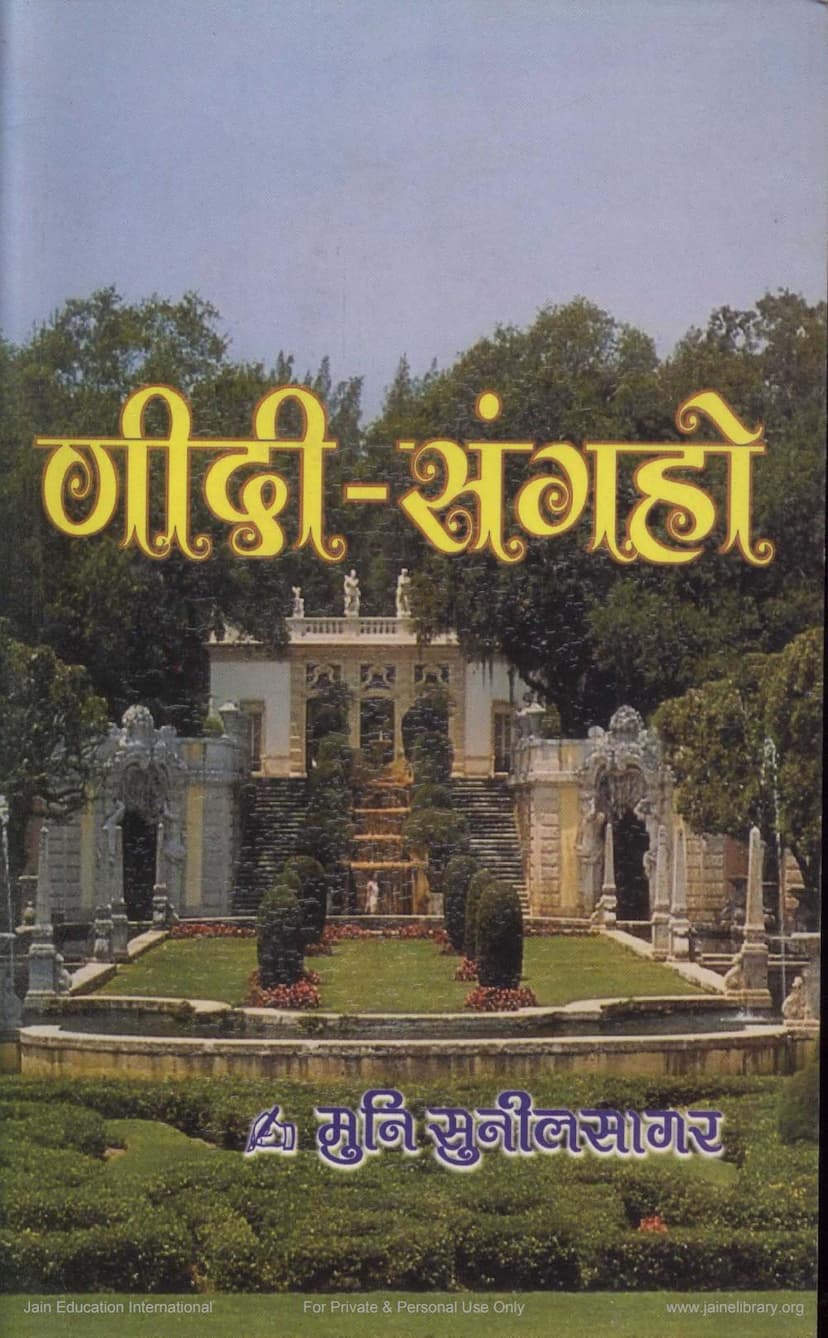Nidi Sangaho
Added to library: September 2, 2025

Summary
Here's a comprehensive summary of the Jain text "Nidi Sangaho" by Muni Sunilsagar, based on the provided pages:
Book Title: Nidi Sangaho (नीदी-संगहो) Author: Muni Sunilsagar Publisher: Jain Sahitya Vikray Kendra, Udaipur Catalog Link: https://jainqq.org/explore/002546/1
Overall Purpose and Structure:
"Nidi Sangaho" is a compilation of beneficial policies and guidelines intended for the daily use and welfare of human society. The author, Muni Sunilsagar, believes that by adhering to these principles, individuals, particularly householders, can become more wise and tranquil. The collection is divided into two main sections: Dharma Niti (Religious Policies) and Loka Niti (Worldly Policies). The book also includes devotional verses at the end, such as Paramatthi-sthuti, Jinendra-sthuti, Chaturvishati-tirthankar-sthuti, Bharati-sthuti, Tirthankar-stav, and Jaya-Mangalam.
Key Themes and Content:
The text emphasizes the importance of righteous conduct, ethical living, and spiritual upliftment, drawing heavily from Jain principles.
Dharma Niti (Religious Policies):
- Devotion and Reverence: The collection begins with a prologue of reverence for the Tirthankaras, Jinendra, and the scriptures. It highlights the importance of worshipping the Jinas, performing Abhishek, and chanting their names as a means to overcome diseases, fears, sorrows, and negative influences.
- The Power of Truth: Truth is presented as the source of various virtues and excellences, including knowledge, education, eloquence, and good poetry. Conversely, speaking falsehood leads to negative consequences like muteness, lack of intelligence, and illness.
- Ahimsa as the Foundation: Ahimsa (non-violence) is identified as the mother of all vows, the mine of all virtues, and the very foundation of the tree of Dharma. Its practice is said to lead to longevity, strength, beauty, good fortune, fame, and ultimately, heaven and liberation.
- Ethical Conduct and Virtues: The text elaborates on virtues like compassion (essential for all living beings), honesty (theftlessness), chastity (Brahma-charya), forgiveness, and self-control. It stresses the importance of abstaining from harmful actions and cultivating positive qualities.
- The Significance of the Human Birth: The human birth is considered precious and the essence of existence, which is further enhanced by nobility of conduct, adherence to Dharma, and compassion.
- The Fleeting Nature of Worldly Possessions: The book repeatedly emphasizes the impermanence of youth, life, wealth, and even mental states, urging readers to find solace and lasting happiness in Dharma.
- The Path to Liberation: The ultimate goal of human life is presented as achieving Moksha (liberation) through the practice of Samyagdarshan (right faith), Samyagjnana (right knowledge), and Samyagcharitra (right conduct). These three are considered the root of Dharma and the means to overcome the cycle of birth and death.
- The Importance of Righteous Living: The text advocates for a life guided by virtuous actions, self-discipline, and devotion to the Jinas. It warns against the dangers of lust, anger, greed, pride, delusion, and attachment, which lead to suffering and hinder spiritual progress.
Loka Niti (Worldly Policies):
- Wisdom and Prudence: The importance of prudence, foresight, and avoiding unnecessary conflicts or provocations is highlighted. Wise individuals are advised to remain calm and avoid angering powerful figures, foolish people, or potentially dangerous beings.
- The Value of Contentment and Simplicity: The text suggests that true happiness lies not in accumulating vast wealth but in contentment with what one has. It criticizes the pursuit of excessive material possessions as a source of suffering.
- The Importance of Good Company: Associating with virtuous individuals and avoiding the company of the wicked is strongly recommended, as good company fosters positive qualities and protects from negative influences.
- The Fruits of Labor and Effort: The book underscores the necessity of effort and diligence in achieving goals, stating that mere wishing is insufficient. It emphasizes that actions, not just intentions, lead to success.
- The Qualities of a Good Citizen and Individual: The text touches upon the importance of respecting elders, being truthful, practicing generosity, and maintaining a disciplined lifestyle. It also describes the characteristics of a good friend, student, and the consequences of vices like laziness, greed, and attachment.
- Social Harmony and Responsibility: The principles extend to social interactions, emphasizing politeness, respectful speech, and the avoidance of slander or harsh words. It also touches upon the importance of familial duties and societal contributions.
Inspirational and Devotional Elements:
The inclusion of various stutis (hymnals) and stavs (praises) dedicated to the Tirthankaras and Goddess Saraswati adds a devotional layer to the practical advice. These verses express deep reverence and seek divine blessings for spiritual growth and well-being.
Praise for the Author and the Work:
The introductory notes and the editorial piece (Samapadakiya) praise Muni Sunilsagar's vast knowledge, command over multiple languages, and his diligent effort in compiling this invaluable collection. The work is commended for its clarity, relevance to everyday life, and its potential to guide individuals towards a more virtuous and fulfilling existence. The text is considered a valuable contribution to Prakrit literature and Jain teachings.
In essence, "Nidi Sangaho" serves as a practical guide to living a life of righteousness, wisdom, and spiritual awareness, rooted in the timeless principles of Jainism. It offers guidance on ethical conduct, personal discipline, and the pursuit of ultimate liberation.